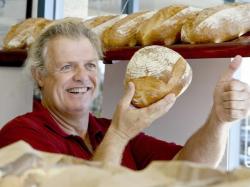The Artisan: StoneGround Breads In Agoura Hills
August 31, 2010 | 1 min to read

In the weeks leading up to Rosh Hashana, Abby Franke and his team of bakers at StoneGround Breads are braiding thousands of egg-and-honey-rich challah loaves by hand. The breads are kosher, as are the hundreds of other Jewish-German products in the Agoura Hills bakery's lineup.
Only the 52-year-old baker isn't Jewish. Franke and his staff are baking those loaves in honor of his friend and former baking partner, Paul Sherman.
The chatty, ponytail-sporting Franke, who comes from Hagen, Germany, readily admits he prefers the rustic whole grain crusty loaves he made while earning his baking meisterbrief (Germany's rigorous seven-year, guild-regulated certificate program for artisan crafts). And that initially he wasn't that crazy about the guy who became his business partner either.
To read the rest of this story please go to: The Los Angeles Times
